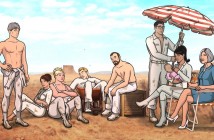April 5, 2015, 10:00 p.m. (EST), AMC
“Is that all there is?”
It’s a question that has lingered over much of Mad Men’s run, as characters amass more and more and yet find themselves unsatisfied with their wealth and accomplishments. It’s a question that haunts our conceptions of the American Dream, a flawed fantasy that has us striving constantly to overcome that next hurdle, to secure our spot on just one higher rung at a time. It’s also, inevitably, a question we can expect to hang over the ultimate end of Mad Men, now fast approaching. We place a crushing weight on a television show’s final hour, and Matt Weiner, formerly of The Sopranos, knows this more than most. Whatever happens at the end of this ride, it’s likely some portion of the audience will be disappointed. This has never been a show that sought to please everyone, and as it comes to a close, I imagine it will do so on its own terms, whether we like it or not.
In his dreams tonight, as before in “The Suitcase,” Don encounters a woman from his past he will soon learn has left the mortal coil. When he witnessed a spectral Anna Draper, her bags were packed. When Rachel Katz visits him in his sleep, she tells him “you missed your flight.” Later, Ken speaks of “the life not lived.” Throughout “Severance,” characters are contending with the choices they’ve made and the places those choices have lead them. Throughout the past decade, many doors have opened, but many others have closed. Don loved Rachel once, and she has hung over this series as a reminder of all that was lacking in him, all that ensured he couldn’t make it work with Rachel, couldn’t let himself have what he wanted. Not then, perhaps, but maybe now. Ten years have passed since this story began. It’s April of 1970, and the question hangs over the proceedings: have these people learned anything? Last season, Don Draper had an epiphany when (a once again spectral) Burt Cooper told him “the moon belongs to everyone, the best things in life are free.” Yet epiphanies are often transitory (to harken back to The Sopranos again, Tony screamed “I get it!” to a desert, but failed to translate his revelation into actual change), a moment of clarity we see as such an accomplishment, the follow through feels like an afterthought. Don is back in his office, back in his job, back to his womanizing ways. Is he just back to his old life, or is there a chance for something more? Is that all there is?
When he visits the shiva being held for Rachel, her sister tells him “She lived the life she wanted to live. She had everything.” It could be that this is just the case, that Rachel got her happy ever after once Don was out of the picture. Or it could be that she learned the greatest lesson Don Draper had to teach: that the illusion of success and happiness is generally enough to convince the world and, for a while anyway, might be enough to convince even yourself. There’s no way to know whether Rachel was happy with the life she built. There’s no way to know whether any of us are happy where we are. We can ask, and hope to trust the answer, but everyone is an expert at spinning their own narrative. Everyone creates the life story they want others to see. Don knows this better than anyone. He’s unraveled more happy endings than most people get a shot at, in his time.
Don tries to make sense of Rachel, and the passage of time, and all he’s lost, over the course of three visits to a diner. In the first, he is recontextualizing his backstory once again. It’s more honest now than it used to be, but it still elides the most painful details. The second feels like a dream to him, like Rachel has reemerged somehow, like he’s being given a magical second chance. In reality, it’s a tragic transaction, where Roger’s tip has left Diana feeling indebted, but to Don in the moment, it must seem like some transcendent moment when the world has come full circle, like a chance to say goodbye to Rachel, and maybe to start something new. In the third, he explains the situation to Diana, and she tells him “Someone dies, you just want to make sense of it, but you can’t.” That’s all there is.
Meanwhile, Joan is insanely rich, and both she and Peggy have achieved great success, yet when they sit in that meeting with McCann Erickson, the misogyny still stings them every bit as much as it did in the secretarial pool. These women have climbed so far, but they still find themselves clawing at a glass ceiling, desperate to find a hand-hold in an environment where they have quite a ways to fall. It isn’t immediately clear whose reaction is sadder: Joan, whose fury is righteous, or Peggy, who is used to all of this and retains her composure in the face of monstrousness. They have both had to give up a lot to make it to where they are; they’ve both lost something of themselves in order to gain positions of respect in a society that won’t respect them.
Later, Peggy’s date with Stevie leads to a conversation about Paris. Stevie thinks Peggy can just write a commercial set there and go, but that isn’t how it works. Peggy realizes she has never taken a vacation, and a sort of panic seems to set in. She has worked hard. She has come so far. But is this the life she has been fighting for all these years? Is this what she has sacrificed for again and again and again? Is that all there is? Peggy got caught up, briefly, in a fantasy she built for herself, one where she was a romantic, one where she was spontaneous, one where she could and would fly to Paris at a moment’s notice on a first date. “It’s nothing a little aspirin won’t fix,” she says coldly the next morning, trying to shake off the after-effects of a heady evening where she glimpsed possibility again, where she got a taste of wanting something more.
The same is true, ultimately, of Ken Cosgrove, who has every chance to walk away tonight and finally become the novelist he’s always wanted to be. He doesn’t, though, and his wife is right when she tells him “there’s always another hurdle.” Ken wants the trappings of success he’s given so much for. He doesn’t feel as entitled as Pete Campbell, but he does feel that he’s lost his eye and his dignity to this business, and he wants something in return. Ken looks at his career and wonders, but we already know the answer.
Because we always know the answer, deep down. The disappointment doesn’t come from the fact that reality doesn’t meet our expectations, it comes from the fact that our dreams don’t always come true. The world isn’t whatever we want it to be. It doesn’t hand us whatever we desire, the second we wish for it. And, perhaps most tragically, it wouldn’t matter if it did. For a certain kind of person (and I venture to think it’s a fairly common type), there’s always a next step, always another feather that could adorn the cap, always one more experience, one more person, one more thing that would make all of this worthwhile. We spend our lives wanting and wondering, assured that there’s a place out there, a version of the world or of ourselves where we have it all, where we’re happy, where we aren’t left curious if there’s something more. It’s a place, just out of reach. You can spend a lifetime chasing it, and never realize how much you’ve run away from in the process.
The Roundup
- “Look at yourself. Do you like what you see?”
- “I never recommend imitation as a strategy. You’d be second. Which is very far from first.”
- “You want a raise? Stop acting like a secretary.”
- “I actually made myself a…what was it honey?” “It was a Pop Tart, Ed.” “It was very good!”
- “Your father was a cog in a giant machine that makes weapons and poison!” “And you sell them!”
- “That’s not a coincidence, that’s a sign!” “Of what?” “The life not lived.”
- “I never fit in. I’m not Irish, I’m not Catholic, I can read…”
- “Now it sort of feels like a dream, but at the time it felt so real!”
- “She lived the life she wanted to live. She had everything.” “Good.”
Throughout “Severance,” characters are contending with the choices they’ve made and the places those choices have lead them.
-
GOOD




